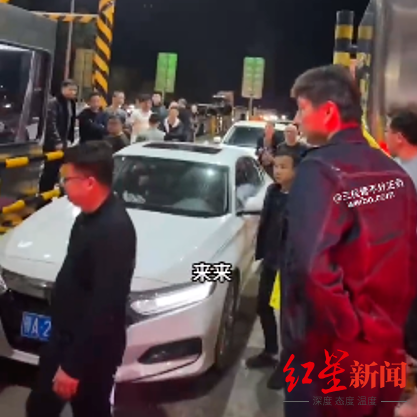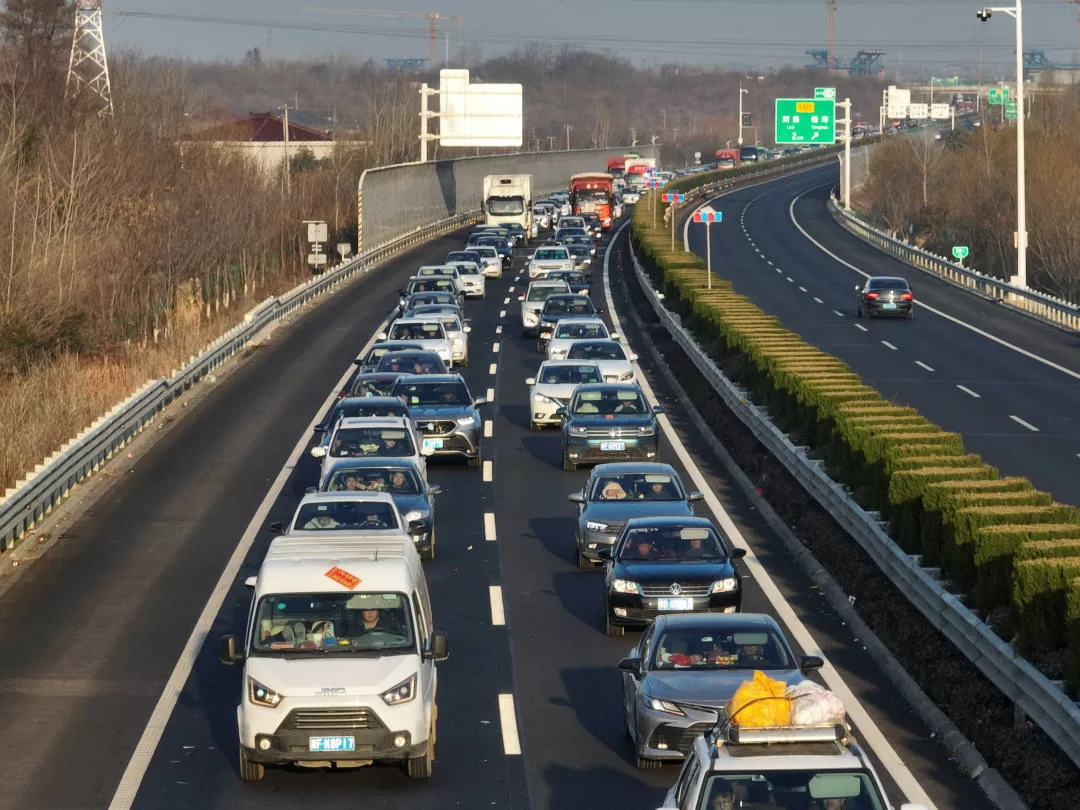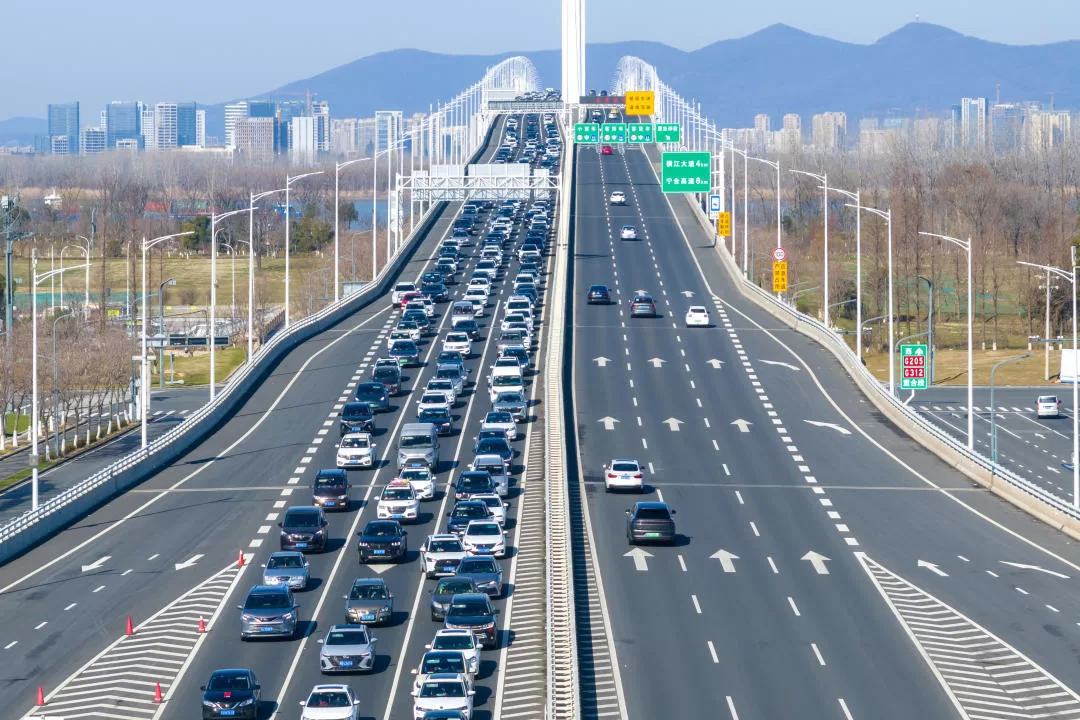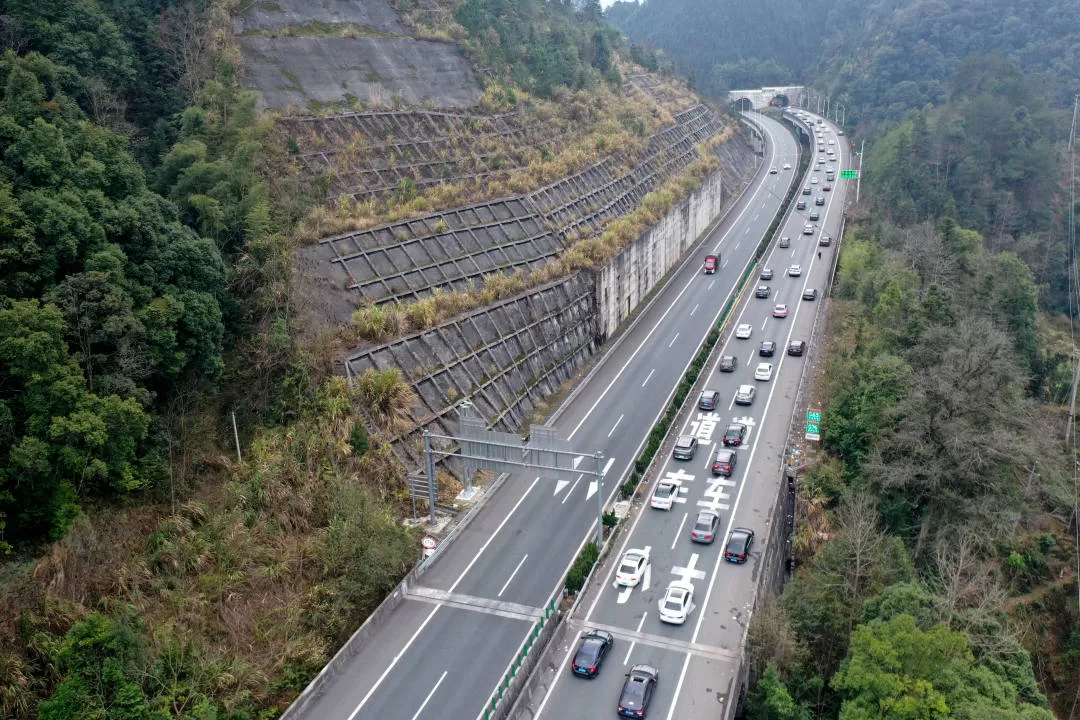During this year’s Spring Festival holiday, our country continues to implement the policy of toll-free highways for small passenger cars. The free period starts from 0:00 on February 9th and ends at 24:00 on February 17th, with the deadline based on the time the vehicle leaves the toll booth. Passing outside the free period requires payment of tolls. On February 18th, a netizen posted a video claiming that at a toll station on a highway in Hunan, a driver was asked to pay tolls just a few minutes after missing the deadline for free Spring Festival tolls. The driver refused to pay the toll, citing traffic delays as the reason. Another person posted a video claiming that a toll station on a highway in Jiangxi extended the free policy by about half an hour. “Vehicles that entered the ramp before 24:00 on the 17th were free, but those that were unable to enter the ramp before 24:00 and were still stuck in traffic were not eligible for free tolls.”
On February 19, Red Star News contacted the management of the toll station in Jiangxi. They denied the rumor that some vehicles were still allowed to pass through the toll station after midnight for free. “The deadline for the free passage of small cars on the expressway during the Spring Festival is unified nationwide, and there is no possibility of relaxation.” Lawyer Yin Qingli of Beijing Fuli Law Firm told Red Star News that the “Implementation Plan for Free Passage of Small Passenger Cars during Major Holidays” has been in place for 12 years. Asking the management to consider the issue of charging after 24:00 due to other factors will inevitably lead to inequality and a series of problems. “And the failure to collect tolls at the ‘checkpoints’ and the behavior of being blocked at the toll station may require criminal responsibility.” Is the toll station in Jiangxi “lenient” for half an hour? Toll station management: Rumor! According to the Ministry of Transport’s “Notice on Optimizing the Free Passage Period for Small Passenger Cars on Toll Roads during the 2024 Spring Festival Holiday,” the free passage period for small passenger cars during the 2024 Spring Festival holiday is from 00:00 on February 9 to 24:00 on February 17. However, on the evening of February 18, some netizens claimed that after 12:00 on the 17th, the Hengshi toll station of Jiangxi Expressway Development and Investment Group still implemented a free passage policy for some vehicles leaving the expressway from the toll station. The message stated, “There was a traffic jam at the time, so vehicles that had entered the ramp before 24:00 on the 17th were allowed to pass for free, while those that had not entered the ramp before 24:00 were not eligible for free passage.”
Some netizens believe that this measure is “more humane” and allows vehicles that missed the free policy due to traffic jams to continue to enjoy free passage. However, others believe that this practice undermines the policy, “since travel requires consideration of the risk of traffic jams, or seeing that the free policy will expire, it is also possible to exit the highway at the nearest toll station.” On February 19, Red Star News reporters contacted the management department of the toll station involved, Jiangxi Jiaotou Jianshi East Management Center. An employee of the center said that the deadline for the free passage of small cars on the highway during the Spring Festival is unified nationwide. Regarding the situation in the video, they are also investigating, but it is definitely a rumor that small cars will continue to be free after the free passage policy period has passed. Mr. Cao, who drove from Xi’an, Shaanxi back to Beijing for work on February 17, told Red Star News reporters that he had calculated through travel software that he could reach Beijing in about 11 hours that day, but in order to ensure that he did not miss the free highway and to avoid wasting time due to traffic jams, he deliberately gave himself 16 hours. He set off from Xi’an at 8 a.m., so he also arrived in Beijing by car before the end of the free policy. Multiple highway management departments: Free passage time cannot be adjusted due to traffic jams and other reasons. On February 18, a netizen posted a video claiming that just after midnight on February 17, at the toll station in Yanling County, Zhuzhou, Hunan, some vehicles were stuck at the toll station and refused to pay because they missed the free highway policy during the Spring Festival holiday. Red Star News reporters saw in the video that some vehicles were stuck at the toll station and the drivers were yelling at the staff. According to the netizen who posted the video, some drivers were asked to pay the full toll because they missed the time for the free highway during the Spring Festival, and the drivers believed that the traffic jam in front of the toll station delayed their departure from the toll station.
On February 19th, Red Star News learned from the Hunan Provincial Expressway Group Co., Ltd. that the holiday exemption for small cars is uniformly regulated by the Ministry of Transport and other departments. Therefore, the highway management department does not have the so-called “grace period” authority for toll collection due to traffic congestion. On February 19th, Red Star News reporters also contacted the staff of the Henan, Hubei, and Guangdong expressway service centers. When asked if drivers could still enjoy the free passage policy if they exit the highway a few minutes after the end of the Spring Festival free policy, staff from multiple expressway management departments all stated that tolls are strictly calculated in accordance with the requirements of the Ministry of Transport, and the toll collection system is nationwide and not managed locally. There is no situation where tolls can be exempted after one or two minutes. Red Star News reporters noted that in July 2012, the Ministry of Transport and other departments issued the “Implementation Plan for Exemption of Toll for Small Passenger Cars during Major Holidays,” which clearly states that the free period starts at 0:00 on the first day of the holiday and ends at 24:00 on the last day of the holiday. For ordinary highways, the time when the vehicle passes through the toll booth is used, and for expressways, the time when the vehicle exits the toll booth is used as the basis for toll collection. The “Major Holiday Free Small Car Toll Implementation Plan” was released by the Ministry of Transport at the same time as the “plan” was released. It was specifically mentioned that “vehicles that meet the free conditions are recommended to plan and choose travel time and routes reasonably.” “For vehicles that may not be able to leave the destination toll station during the free period, they can choose a suitable toll station in advance based on the actual driving time and location, leave the expressway before the end of the free period, and then reapply for a card to enter the expressway again. The amount to be paid after arriving at the destination toll station is only the amount to be paid for the section of the road after reapplying for the card, not the amount to be paid for the entire journey.” Lawyer’s interpretation: Because “checkpoints” fail to block toll stations, they may be criminally liable On February 19th, Yin Qingli, a lawyer from Beijing Fulai Law Firm, told Red Star News that the “Implementation Plan for Free Small Car Toll during Major Holidays” was approved by the State Council and was jointly formulated by the Ministry of Transport, the National Development and Reform Commission, the Ministry of Finance, the Supervision Department, and the State Council’s Rectification Office as a convenience measure, and it was also a legal act fixed in the form of regulations. The implementation plan does not specify corresponding special matters disposal or relief content. In addition, this plan is based on the sacrifice of the economic interests of the paid management stations and operators. In this case, letting the management department consider the so-called free period due to other factors will inevitably create another kind of inequality and a series of relief issues. Therefore, setting up a “checkpoint” for charging before 24 hours is not only legal but also reasonable and in line with legal requirements.
Yin Qingli said, “The implementation plan for exempting small passenger vehicles from tolls during major holidays” has been in effect for nearly 12 years. Drivers are fully aware of the potential overtime issues that may arise. In addition, in 2012 when the plan was implemented, the authorities provided clear interpretations and reminders. Yin Qingli explained, “If drivers pass through toll stations without being exempted due to related reasons and cause serious congestion, they may face administrative penalties for violating public security management regulations, or even criminal responsibility under Article 291 of the Criminal Law of the People’s Republic of China, for disturbing the order of stations, terminals, civil aviation stations, shopping malls, parks, theaters, exhibitions, sports venues, or other public places, as well as obstructing traffic or disrupting traffic order.” “In case of disputes, drivers can file complaints with consumer associations after paying the toll, or seek legal recourse through civil litigation.” Fu Jian, director of Henan Zejin Law Firm, believes that the toll-free policy reflects the state’s concern for people’s livelihoods, reduces the travel expenses of vehicle owners, and plays a positive role in promoting consumption and stimulating domestic demand. The clear start and end times for toll-free passage and strict enforcement of regulations reflect the rule of law and ensure the fairness of the policy. Frequent changes or extensions of the toll-free period may lead to management chaos. “Drivers should abide by traffic rules and not park illegally in toll stations or other areas, as this may lead to legal issues. Prolonged congestion at toll stations may affect traffic order and even constitute a violation of public security management. Relevant departments should carry out publicity work in advance, guide vehicle owners to arrange their travel time reasonably, and avoid concentrated congestion,” Fu Jian said. Red Star News reporter Fu Yao, intern Wu Jiaxin Editor: Guo Zhuang, Editor-in-Chief: Deng Peiguang



